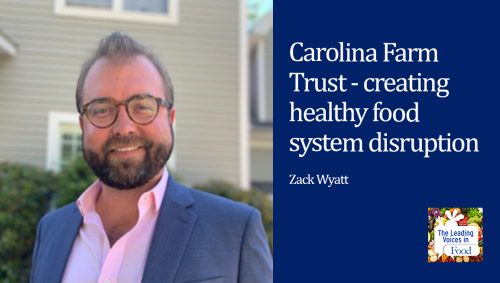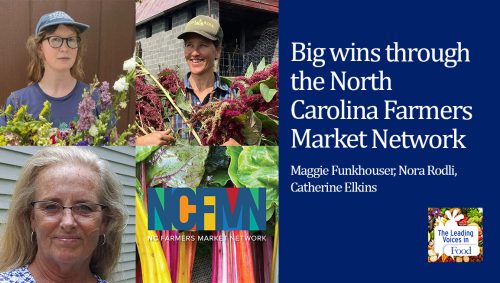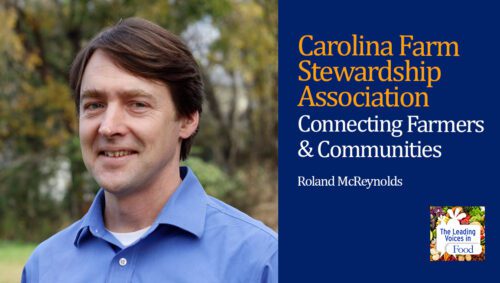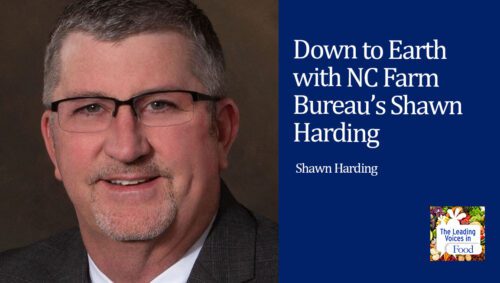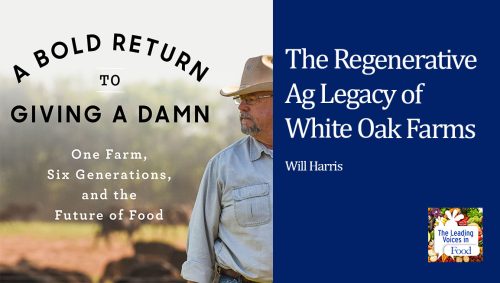The Leading Voices in Food
E11: Kornegay Farms’ Kim LeQuire on the Blessings of a Life in Agriculture
Has the buy local food movement helped farmers and open up new markets? Is organic farming really better than conventional farming? And what does it take to run a successful farming operation? We’ll discuss these topics and more with today’s guest Kim LeQuire. Kim runs Kornegay Family Farms along with her father Danny, mother Susie and brother Dan. Kornegay Family Farms is a 5,000 acre, fourth generation farm in Johnston County, North Carolina. The Kornegay’s grow sweet potatoes, tobacco, soybeans, cotton, wheat, and peanuts. The also run four swine finishing floors.
Subscribe: Apple Podcasts | TuneIN | Google Podcasts | SoundCloud | PocketCasts | Radio Public
Tags: Agriculture & Tech | Community & Economic Development | North Carolina | Voice of Farming |

Kim LeQuire runs Kornegay Family Farms along with her father Danny, mother Susie and brother Dan. Kornegay Family Farms is a 5,000 acre, fourth generation farm in Johnston County, North Carolina. The Kornegay’s grow sweet potatoes, tobacco, soybeans, cotton, wheat, and peanuts. The also run four swine finishing floors.
Interview Summary
You weren’t always engaged in your family’s farm, and now you’re in charge of human resources, payroll, customer service, public relations, labor compliance, and a little bit of everything in between–including supervising the farm’s food safety program. What changed for you that you decided to come back to work on the farm?
I was a stay at home mom for about 10 years, which I loved. My youngest child started preschool, and my dad had always said when you get your the boys in school, and you’ve got some free time we’d love to have you on the farm and working with us. So that’s what I did. I got my son in preschool and started helping out in the office a little bit. The longer I worked and the more experience and knowledge I gained, my job title and roles on the farm expanded and grew with my experience. It’s worked out really well. It’s been a blessing to have the flexibility of being my own boss, so to speak.
Farming is deeply embedded in families, but for many people in many professions, individuals don’t necessarily follow in their parents’ footsteps. That appears not the case with farming. So what is it about the farm that draws generation after generation into that profession?
Well, part of it is the necessity of having your children there to continue this succession of the farm. It’s really a way life to be able to have your children with you working side by side. To show them the ropes, so to speak. And it’s a point of necessity, but it’s also a point of pride. We do this because it is a way of living, surely. But we just love this. We love living out in the country. We love seeing something that we put in the ground as a seed or as a plant grow and take shape. Knowing that eventually, it’s going to wind up as a pair of jeans or a shirt, when you’re talking about cotton, or it’s going to end up on somebody’s plate when you’re talking about sweet potatoes or watermelon.
I’m sure that my children don’t quite grasp that significance right now since they are now ages 11 to 16. And I certainly didn’t when I was their age, but to me it’s amazing now that I get to be a part of the food supply, working with my parents, working with my brother. It’s almost something that’s hard to describe and to put in words if you haven’t lived it. But that’s part of, I think, why farms are multigenerational. We’re always together, and we know how important it is to pass this on. And it’s almost like an apprenticeship that starts when you’re a toddler. When you get your first toy tractor unless you just don’t want to do it at all. There are lots of farm kids that grow up and don’t work on the family farm, and there’s nothing wrong with that. But most of the farm kids of folks my age that we’ve grown up on the farm and we’re third, fourth, fifth generation farmers, there was never any doubt that was going to be something that we did one day.
At your family farm, which is very large and very diverse, a lot of decisions have to be made about what to plant and how much to plant. How were those decisions made because you grow a lot of different things?
A lot of it is what are the costs of the seed or the plants, what is the cost of the inputs? Labor costs are a major thing. You mentioned in the introduction that we grow peanuts. Actually, this was the first year that we’ve not grown peanuts, and the reason for that is literally you make peanuts when you’re growing peanuts. Peanuts take a lot more inputs and labor than you would think in the growing stage. And then also when it’s time to harvest them because they have to be turned over first and then they have to lay on top of the ground for 10 days to two weeks to dry out. And then they have to be picked and go through a dryer again. And when we were thinking about the equipment that we had invested in it and the farm laborers and equipment operators that we had invested in planting, cultivating, fertilizing, and harvesting, it just does not make economic sense for us to continue with peanuts.
Given what you just said, why not pick the one crop that has the least cost and the greatest return and plant just that?
Well, because you have to have crop rotation to have that one crop continue to be good year after year. You have to rotate it. You can’t grow it on the same piece of land year after year, or it will be susceptible to the problems that land may have. That may be drainage or soil fertility not being there, pest pressure, or weed pressure. As you mentioned a few minutes ago, our diversity helps us out tremendously because we can rotate crops on a three-year rotation, which is good for all the crops and it’s good for us. And the labor that we have for our tobacco, for instance, it also helps us with our soybeans.
So when we toured your farm, I was impressed with the scale of your sweet potato operation. And you do more than just grow the sweet potatoes and harvest them–you process them as well. Could you give us a sense of how large sweet potato crop is and what happens after the sweet potatoes are harvested?
Well, in a traditional year where there’s not a hurricane, as we had this past year, we have grown 800 to 1,000 acres of sweet potatoes for the last three years. So we harvest those and put those into our curing rooms, and after 10 days, the curing room will turn into a storage room where we will keep them at the right temperature and humidity to preserve them year round. Many commodities like bell peppers, for instance, or watermelons or greens have a very limited growing to harvest window because they’re highly perishable. Sweet potatoes can be stored year round. So when we harvest those in the weeks between September 1st through October 31st, we can store them year round and the pack them as orders come out throughout the year. I think I told the group when y’all were here–because of modern storage technology, the sweet potatoes that you’re eating at Easter is just as good as the one you had at Thanksgiving because we’re able to control the temperature and the humidity. So when we have the orders come through for different customers, and we dump the potatoes out of the same bin that they were put in at harvest. We don’t wash them prior to receiving that order. They’re dumped out that day from that bin, and they are washed that day. In fact, according to order, to go either the next day or in a couple days. We don’t keep anything on the floor or longer than 72 hours. And your sweet potato is delicious. It tastes good. And it’s preserved well because of the way it’s been stored throughout those months since it was harvested.
Another thing that impressed me when I was listening was how many sophisticated and complex decisions a farmer has to make. Particularly on a farm of your size, you’re making massive investments in equipment. You have labor that has to be hired on a seasonal basis. There are the questions about when to release things into the market. All these sorts of things are very complicated, and most people probably don’t appreciate the business sophistication of successful farmer has to have. Would you mind commenting on that?
I couldn’t agree more. There are lots of decisions that go into what we do here on a daily basis. Some decisions we make and some decisions are projections for what’s coming up in the future. And there’s always things that we cannot control–the weather being the top one. But we do have to think about what’s the revenue been from this particular crop over the past few years and can we justify growing it again? Do we need to have as many seasonal laborers in this year when we know that the labor rate is increasing in 2019? The fuel costs that we know about. Do we need to book propane right now where it’s at this rate or is it going to go down a little bit in a few weeks or few months? These are all things that are major decisions for us, and they have huge impacts when it comes to making a profit. And people might be surprised to hear farmers say we need to make a profit. I mean, that sounds like something a business person would say. Well, I am a business person. This is a business. We’re farmers, and we love the land, and we live out in the country, and we kind of have a simple way of life, but that doesn’t mean that week we don’t treat what we do and how we make our living as a business. We have to to sustain ourselves and to have this to pass onto the next generation.
Have you noticed any changes over the years in the role that women play in farming?
I think so. My mom has always been involved in the farm. My mom could run a tractor, she could run a harvester in the field, harvesting tobacco. She could run a crew at the barns either barning the tobacco or taking it out. And that’s what most of my mom’s generation did. And of course, the farm mom always kept the books. I remember watching my grandmother when our employees would bring their time that they kept in little memo pad to her. She would figure it out their time and write their checks at the end of each week. So farm moms have always been involved in books and things like that since I can remember. But I do think a woman’s role on the farm has evolved into more of helping make the decisions. And, being where I am, where I’m managing the HR and the customer relations and trying to get our word out to the public. That wasn’t such a big of a deal. The public persona of farmers, when I was growing up. I feel like farmers were more admired when I was a child. And not that farmers are not admired now, but it seems like what we’re doing is misunderstood and not appreciated. And that’s why I thank you so much for giving me this opportunity to talk about what kinds of things we do go through.
What do you think is misunderstood about farming?
I don’t think people realize how much we just love it and what it means to us. Me, my children, my family, we eat the same food that we send out to the public. So I think there’s a lot of misconceptions about applications that are put on crops–chemicals and pesticides for instance, but everything is a chemical. Water is a chemical, and I think that word scares people. If there was more time taken to understand things and how all those work. But I feel like if people would ask their farmer, what do you use this for? There are fewer chemicals used now than there were 10-15-20 years ago because of the advances in science and technology. We love the technology that has been brought us through our iPhone and all the things that we can do on the Internet. So it seems like technology and science advances on farms though, and agriculture has been viewed as in a kind of a negative light. We’re able to use less chemical than we did 20 years ago or even 10 years ago because of science and the way that these chemicals are made.
That brings up an issue a lot of people care about which is organic farming. Some people think that it’s inherently better for both people in the environment than conventional farming. What is your opinion on that?
I don’t think that organic is better than conventional. Conventional is not better than organic. I think these are two different ways to farm and I don’t feel that conventional folks should be leading the charge against organic and vice versa. I do not believe that you can feed a nation or the world through organics just because of the strict guidelines involved in that and not being able to use the plant protection products or chemicals and pesticides that we use in conventional farming. You’re not going to generate the kind of yields that you would have in conventional if you farmed organically like that. We know that the way that conventional farmers plant and grow things, we can produce high yields and high-quality yields that feed the country and feed the world. And we don’t see those same kinds of outputs. With organic farming, it’s more of a niche market. And, and I’m not saying that to be negative, I just think it definitely has its customer base. But if you don’t look at the big picture and how many people you are going to be able to feed, I don’t think it is sustainable for feeding the world.
For example, organic farmers use manure own on their fields as a fertilizer. And to put that in perspective, we’re global gap certified for our packing line, and for us to be global gap certified, we had to stop our cow operation. We used to raise about 100 cattle a year, but our cattle pasture was within so many feet of where we were going to build our packing line. So we had to sell our cows and get rid of our cows because of the sanitation issue. E.g., them being close to a food packing operation. But organic farming uses manure as a fertilizer. So not everything always makes sense or is connected when you’re looking at some of the standards that we have to follow.
A lot of people are interested in buying food grown more locally than might’ve been the case in the past. Has this affected your operation and the way you and your family think about farming?
Well, in some ways it has opened up some avenues for new business for us. And uh, I think in North Carolina, the North Carolina Department of Agriculture has done a fantastic job with the Goodness Grows Program. There’s a lot of folks that are farming small acreage or producing a value-added item they’ve grown on their farm, and they have an outlet for that because of the way the local movement has been promoted. I think this is a wonderful thing. There certainly has to be a balance though. There are many produce items that we can’t get in North Carolina, or other states can’t get based on the season. So I don’t hold it against that farmer in Mexico or Peru that can provide me with something that I can’t grow myself in January or February.
I think that consumers need to educate themselves on these types of things. When is local better than somewhere aways off? Most produce is not produced in January or December, and there’s nothing wrong with if it’s not local. But there are sometimes issues with stores–retailers. They put a lot of money into marketing that local side, which is a good thing. However, we have experienced ourselves, in the last two seasons, local grocery stores that we have tried to sell our asparagus and our watermelon to and they do not want to do business with us because they believe we’re asking too much. They have sourced from other states. One example is, and I won’t say the retailer, but one example is watermelons from another state who’s season was over with. In North Carolina, our season was in full swing. So, of course, this retailer could get his watermelons from this other state cheaper. So even though they had spent a lot of money on how important local produce was to them, they were going to source from somewhere else because they could get it cheaper. And I understand that, and I understand the bottom line. You have to be sustainable. However, don’t speak out of both sides of your mouth. If you really think local is important, then support your local growers. When I brought this up, I actually tweeted this store about it and tagged them in a tweet to ask them why. Their solution was not to source more from North Carolina. They told me they would have that store remove the local produce sign from that store display.
And then another thing is with asparagus. It’s not a labor-intensive crop, but it takes a long time to harvest because you have to go about it slowly. And you don’t want to damage it when you’re picking it. You’re actually breaking it off at the bottom. So it’s a very slow process, and when you are paying an hourly rate to your workers, it takes a lot of hours to generate the kind of volume that a grocery store or distribution center wants to purchase.
Consequently, the South American asparagus market–they do not have the labor regulations that we have here in the US. They can pay their laborers pennies compared to what we pay ours. So their asparagus was around $3 a pound back in the spring, whereas local asparagus, for us to make a profit off of it in the store, it would need to be around $7 for one pound bundle. So, you know, local is a fantastic and beautiful thing if your retailers would get behind the farmer.
And I think the smaller chains and the farmer’s markets do that and are fantastic about it. But we need these big box stores to get behind farmers and help them. You don’t see a lot of new farms coming up for a reason, but you do see a lot of new grocery stores popping up all over the place. And that’s because a lot of that money, instead of being distributed back to the farmer or paying the farmer a better price for their goods, the stores are keeping it in building more stores or spending more on marketing. Whereas \your small family farms are kind of going out of business. Really.
One final question. If there’s one big thing or one takeaway thing you’d like people to know about agriculture and farming and what might that be?
Farming has changed so much just in the last 10 years, but really over the last 50 years with advances in technology. We can farm so much more efficiently now. It is a business. The point of saying it’s a business, but it also is most of the time family business, and we want to share what we do with others. It is a source of income for us, but as we’ve talked about earlier, well, we do love what we do. In North Carolina, it seems we’ve had some farmers come under fire in the past few months.
I think there’s a lot of misinformation and misunderstanding out there about what farmers do and the products that we use on our crops. And if people would just ask us and let’s have a good discussion about things. Try to understand each other; listen to learn, not listen to object. I think consumers would understand us better and maybe we would know more about what the consumer is wanting. I promise you that we are trying our best to meet the consumer’s demand for safe and healthy and nutritious food. That’s the way we approach our business every day. It means a lot to us too. We want the same things.

